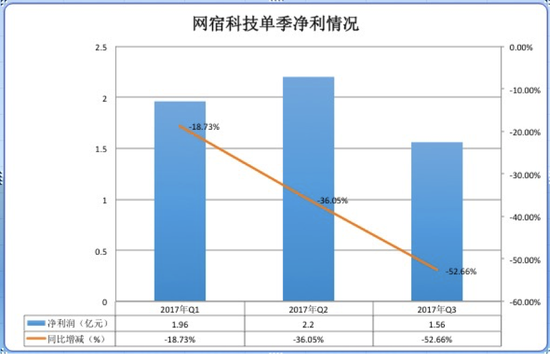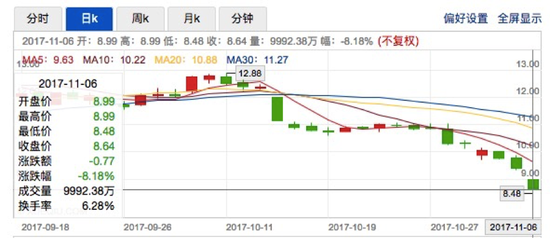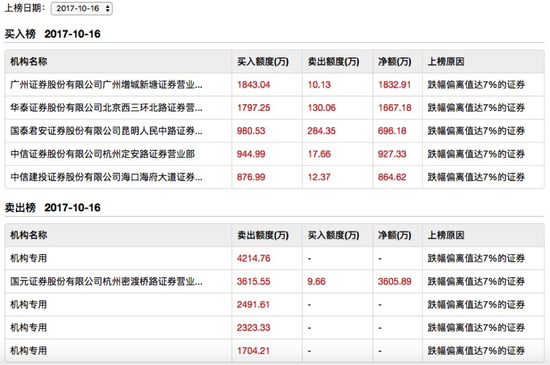ChinaNetCenter's share price fell by more than 30% in a single month, and executives’ intensive reductions were questioned

Reporter Liu Minjuan
This year, former GEM Baima Shares Cyberspace Technology (300017.SZ) seems to be losing its shine. After three consecutive quarters of declining net profits, the company's stock price has also started to fall sharply, especially since October. The decline has become increasingly evident.
Following the drop on October 16, ChinaNetCenter fell into a "downward spiral." On November 6, it dropped by 8.18%. Since October 9 this year, the stock price has fallen over 30%, leaving many investors feeling frustrated and uncertain about the future of the company.
As the stock price continues to fall, the announcement of executives selling their shares has sparked widespread dissatisfaction among small shareholders. Some investors have even labeled the company as a “rogue company†and accused it of potentially manipulating the stock price. Calls for joint reporting have also emerged on investor forums.
1. Revenue Growth Without Profit Increase: A Vicious Cycle
2017 can be described as a challenging year for ChinaNetCenter in terms of performance. In Q1 2017, the company reported revenue of 1.175 billion yuan, up 20.6% from the previous year, but net profit attributable to shareholders dropped by 18.73% to 196 million yuan. By mid-2017, total revenue reached 2.442 billion yuan, up 18.78%, but net profit fell further to 416 million yuan, down 29% year-on-year.
In Q3, revenue rose to 1.355 billion yuan, a 16.19% increase, but net profit plummeted by 52.66% to 156 million yuan. For the first nine months of the year, revenue grew 17.84% to 3.797 billion yuan, while net profit declined 37.53% to 572 million yuan. This pattern shows that despite rising revenues, the company is struggling to maintain profitability, entering a troubling cycle of growth without profit.

The company attributed the declining net profit to intensified competition in the domestic CDN market and falling prices, which reduced gross margins and directly impacted profitability. According to GF Securities, although the gross margin may stabilize in the short term, factors like tax rebate fluctuations and rising operating expenses—outpacing revenue growth—are weighing on profits. These pressures are expected to continue in the short and medium term.
2. Stock Price Plummets Over 30% in One Month, Market Value Drops by 9 Billion Yuan
With such underwhelming performance, it’s no surprise that ChinaNetCenter’s stock has continued to decline. After hitting a limit-down on October 16, the stock fell another 8.18% on November 6, closing at 8.64 yuan per share. Compared to the closing price of 12.75 yuan on October 9, the stock has lost 32.24% in just under a month, meaning the drop exceeded 30%.

As a result, the company’s market value has dropped from around 30 billion yuan to approximately 21 billion yuan, with a loss of about 9 billion yuan in market value within a single month.
Notably, Blue Whale TMT discovered through open data that four institutions sold nearly 107 million yuan worth of shares on October 16. On November 6, the stock ranked among the top five with the largest daily losses. According to Dragon and Tiger data, Netbook Technology bought 64.4 million yuan worth of shares, while the top five sellers offloaded 143.6 million yuan, more than double the buying amount.


3. Major Shareholders and Executives Sell Shares, Fueling Doubts
On November 6, ChinaNetCenter announced that several senior executives, including Vice President Chu Minjian, Huang Shalin, Xiao Wei, and Board Secretary Zhou Liping, plan to collectively sell up to 10.69 million shares via collective bidding over the next three months, representing approximately 0.44% of the company’s total shares. They cited personal capital needs and tax obligations related to option exercises as reasons for the sales.

Although the reduction accounts for only 0.44% of the total shares, these executives hold about 1.77% of the company’s shares, and the planned reduction represents 25% of their holdings. This is not a small amount. Just days earlier, the company also announced that the actual controller, Chen Baozhen, plans to reduce his stake, with the proposed reduction not exceeding 36.17 million shares, or 1.5% of the total shares. He currently holds 437 million shares, or 18.11% of the company, meaning the planned reduction would account for 8.3% of his personal holdings.
Wind data shows that in the third quarter alone, senior executives and controllers reduced over 17,700 shares in total. When questioned about the executive share reductions, the company stated that all actions were in compliance with securities laws and would not affect corporate governance or operations. However, some small shareholders remain highly dissatisfied, calling the company a “rogue company†and questioning whether it is manipulating the stock price. Some have even called for collective reporting on investor platforms.
JIANGSU BEST ENERGY CO.,LTD , https://www.bestenergy-group.com